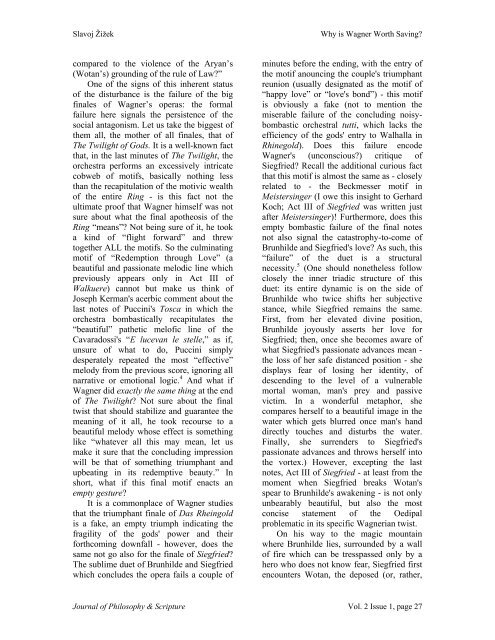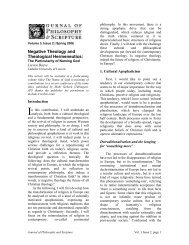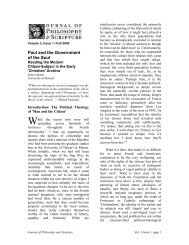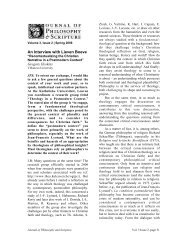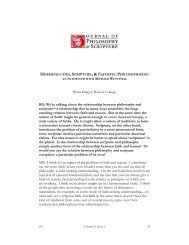Why is Wagner Worth Saving? Slavoj Žižek - Journal of Philosophy ...
Why is Wagner Worth Saving? Slavoj Žižek - Journal of Philosophy ...
Why is Wagner Worth Saving? Slavoj Žižek - Journal of Philosophy ...
Create successful ePaper yourself
Turn your PDF publications into a flip-book with our unique Google optimized e-Paper software.
<strong>Slavoj</strong> Žižek<br />
<strong>Why</strong> <strong>is</strong> <strong>Wagner</strong> <strong>Worth</strong> <strong>Saving</strong>?<br />
compared to the violence <strong>of</strong> the Aryan’s<br />
(Wotan’s) grounding <strong>of</strong> the rule <strong>of</strong> Law?”<br />
One <strong>of</strong> the signs <strong>of</strong> th<strong>is</strong> inherent status<br />
<strong>of</strong> the d<strong>is</strong>turbance <strong>is</strong> the failure <strong>of</strong> the big<br />
finales <strong>of</strong> <strong>Wagner</strong>’s operas: the formal<br />
failure here signals the pers<strong>is</strong>tence <strong>of</strong> the<br />
social antagon<strong>is</strong>m. Let us take the biggest <strong>of</strong><br />
them all, the mother <strong>of</strong> all finales, that <strong>of</strong><br />
The Twilight <strong>of</strong> Gods. It <strong>is</strong> a well-known fact<br />
that, in the last minutes <strong>of</strong> The Twilight, the<br />
orchestra performs an excessively intricate<br />
cobweb <strong>of</strong> motifs, basically nothing less<br />
than the recapitulation <strong>of</strong> the motivic wealth<br />
<strong>of</strong> the entire Ring - <strong>is</strong> th<strong>is</strong> fact not the<br />
ultimate pro<strong>of</strong> that <strong>Wagner</strong> himself was not<br />
sure about what the final apotheos<strong>is</strong> <strong>of</strong> the<br />
Ring “means”? Not being sure <strong>of</strong> it, he took<br />
a kind <strong>of</strong> “flight forward” and threw<br />
together ALL the motifs. So the culminating<br />
motif <strong>of</strong> “Redemption through Love” (a<br />
beautiful and passionate melodic line which<br />
previously appears only in Act III <strong>of</strong><br />
Walkuere) cannot but make us think <strong>of</strong><br />
Joseph Kerman's acerbic comment about the<br />
last notes <strong>of</strong> Puccini's Tosca in which the<br />
orchestra bombastically recapitulates the<br />
“beautiful” pathetic mel<strong>of</strong>ic line <strong>of</strong> the<br />
Cavaradossi's “E lucevan le stelle,” as if,<br />
unsure <strong>of</strong> what to do, Puccini simply<br />
desperately repeated the most “effective”<br />
melody from the previous score, ignoring all<br />
narrative or emotional logic. 4 And what if<br />
<strong>Wagner</strong> did exactly the same thing at the end<br />
<strong>of</strong> The Twilight? Not sure about the final<br />
tw<strong>is</strong>t that should stabilize and guarantee the<br />
meaning <strong>of</strong> it all, he took recourse to a<br />
beautiful melody whose effect <strong>is</strong> something<br />
like “whatever all th<strong>is</strong> may mean, let us<br />
make it sure that the concluding impression<br />
will be that <strong>of</strong> something triumphant and<br />
upbeating in its redemptive beauty.” In<br />
short, what if th<strong>is</strong> final motif enacts an<br />
empty gesture?<br />
It <strong>is</strong> a commonplace <strong>of</strong> <strong>Wagner</strong> studies<br />
that the triumphant finale <strong>of</strong> Das Rheingold<br />
<strong>is</strong> a fake, an empty triumph indicating the<br />
fragility <strong>of</strong> the gods' power and their<br />
forthcoming downfall - however, does the<br />
same not go also for the finale <strong>of</strong> Siegfried?<br />
The sublime duet <strong>of</strong> Brunhilde and Siegfried<br />
which concludes the opera fails a couple <strong>of</strong><br />
minutes before the ending, with the entry <strong>of</strong><br />
the motif anouncing the couple's triumphant<br />
reunion (usually designated as the motif <strong>of</strong><br />
“happy love” or “love's bond”) - th<strong>is</strong> motif<br />
<strong>is</strong> obviously a fake (not to mention the<br />
m<strong>is</strong>erable failure <strong>of</strong> the concluding no<strong>is</strong>ybombastic<br />
orchestral tutti, which lacks the<br />
efficiency <strong>of</strong> the gods' entry to Walhalla in<br />
Rhinegold). Does th<strong>is</strong> failure encode<br />
<strong>Wagner</strong>'s (unconscious?) critique <strong>of</strong><br />
Siegfried? Recall the additional curious fact<br />
that th<strong>is</strong> motif <strong>is</strong> almost the same as - closely<br />
related to - the Beckmesser motif in<br />
Me<strong>is</strong>tersinger (I owe th<strong>is</strong> insight to Gerhard<br />
Koch; Act III <strong>of</strong> Siegfried was written just<br />
after Me<strong>is</strong>tersinger)! Furthermore, does th<strong>is</strong><br />
empty bombastic failure <strong>of</strong> the final notes<br />
not also signal the catastrophy-to-come <strong>of</strong><br />
Brunhilde and Siegfried's love? As such, th<strong>is</strong><br />
“failure” <strong>of</strong> the duet <strong>is</strong> a structural<br />
necessity. 5 (One should nonetheless follow<br />
closely the inner triadic structure <strong>of</strong> th<strong>is</strong><br />
duet: its entire dynamic <strong>is</strong> on the side <strong>of</strong><br />
Brunhilde who twice shifts her subjective<br />
stance, while Siegfried remains the same.<br />
First, from her elevated divine position,<br />
Brunhilde joyously asserts her love for<br />
Siegfried; then, once she becomes aware <strong>of</strong><br />
what Siegfried's passionate advances mean -<br />
the loss <strong>of</strong> her safe d<strong>is</strong>tanced position - she<br />
d<strong>is</strong>plays fear <strong>of</strong> losing her identity, <strong>of</strong><br />
descending to the level <strong>of</strong> a vulnerable<br />
mortal woman, man's prey and passive<br />
victim. In a wonderful metaphor, she<br />
compares herself to a beautiful image in the<br />
water which gets blurred once man's hand<br />
directly touches and d<strong>is</strong>turbs the water.<br />
Finally, she surrenders to Siegfried's<br />
passionate advances and throws herself into<br />
the vortex.) However, excepting the last<br />
notes, Act III <strong>of</strong> Siegfried - at least from the<br />
moment when Siegfried breaks Wotan's<br />
spear to Brunhilde's awakening - <strong>is</strong> not only<br />
unbearably beautiful, but also the most<br />
conc<strong>is</strong>e statement <strong>of</strong> the Oedipal<br />
problematic in its specific <strong>Wagner</strong>ian tw<strong>is</strong>t.<br />
On h<strong>is</strong> way to the magic mountain<br />
where Brunhilde lies, surrounded by a wall<br />
<strong>of</strong> fire which can be tresspassed only by a<br />
hero who does not know fear, Siegfried first<br />
encounters Wotan, the deposed (or, rather,<br />
<strong>Journal</strong> <strong>of</strong> <strong>Philosophy</strong> & Scripture Vol. 2 Issue 1, page 27


